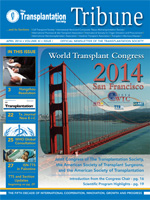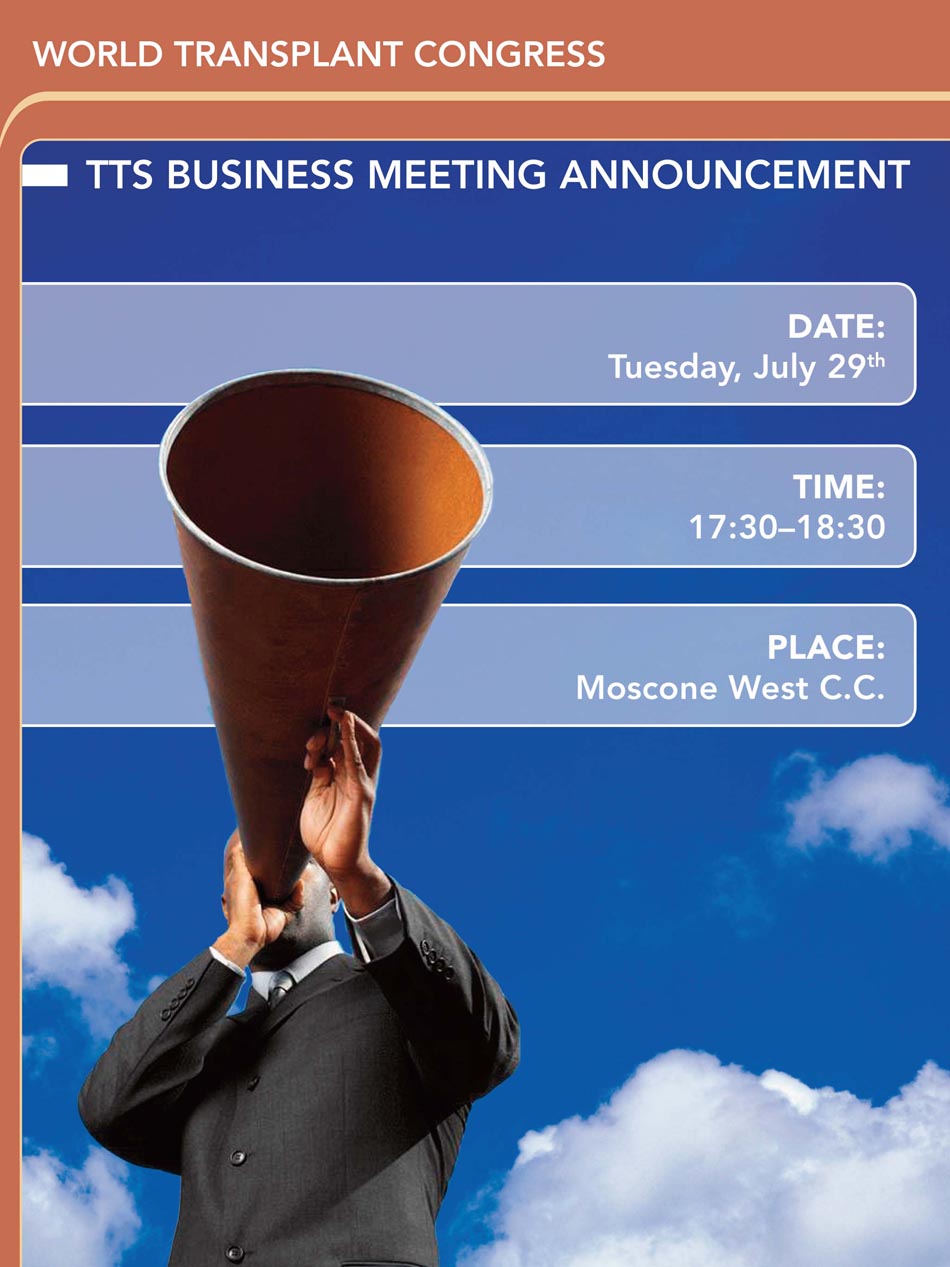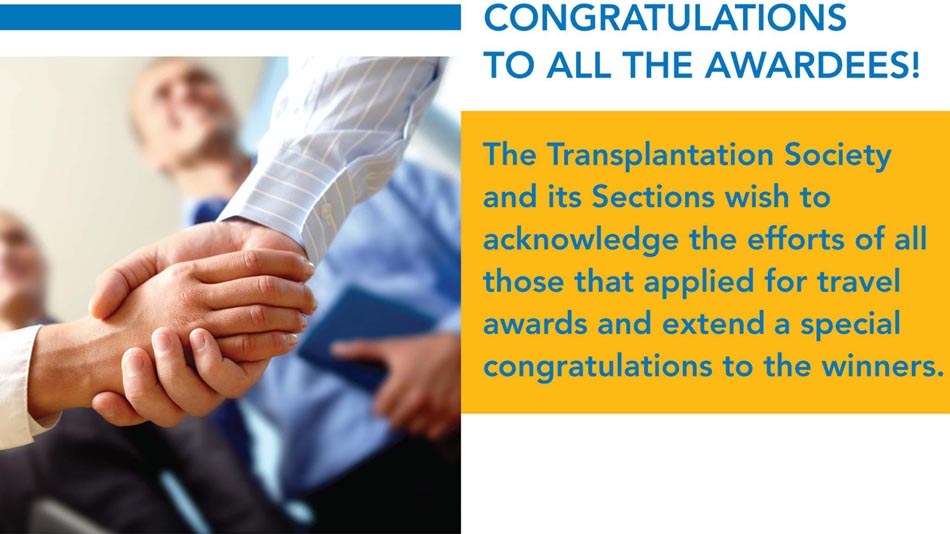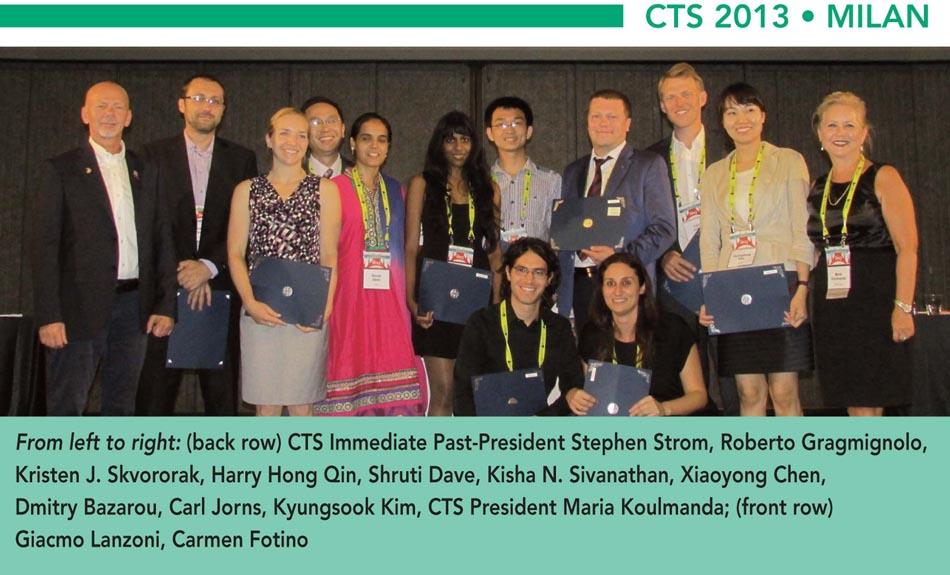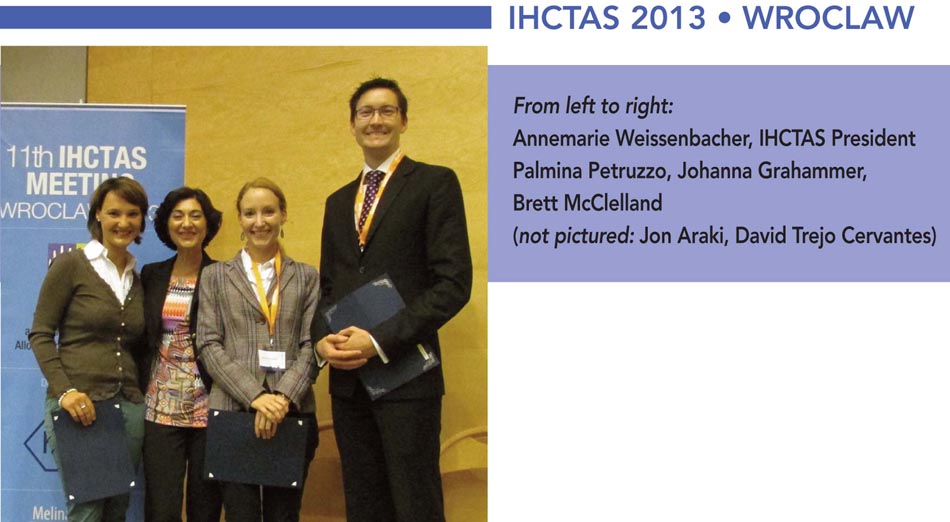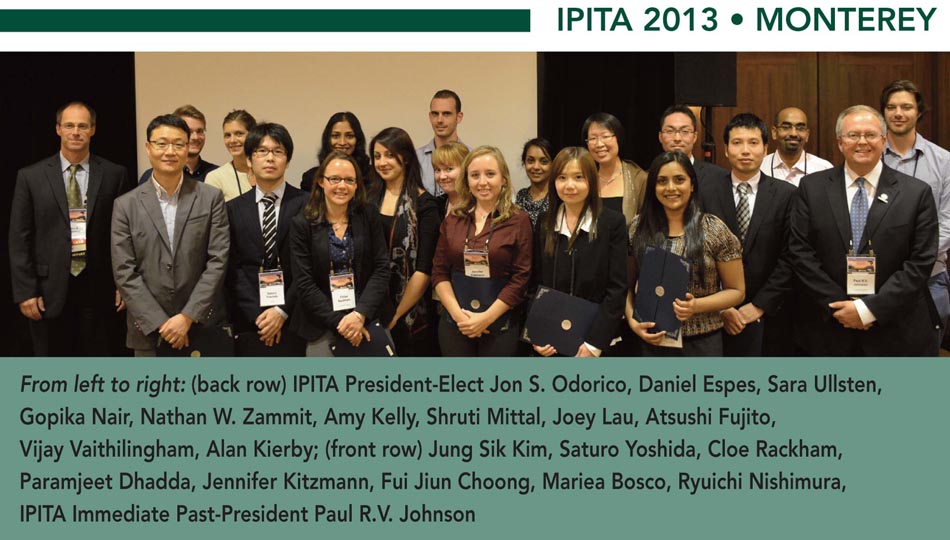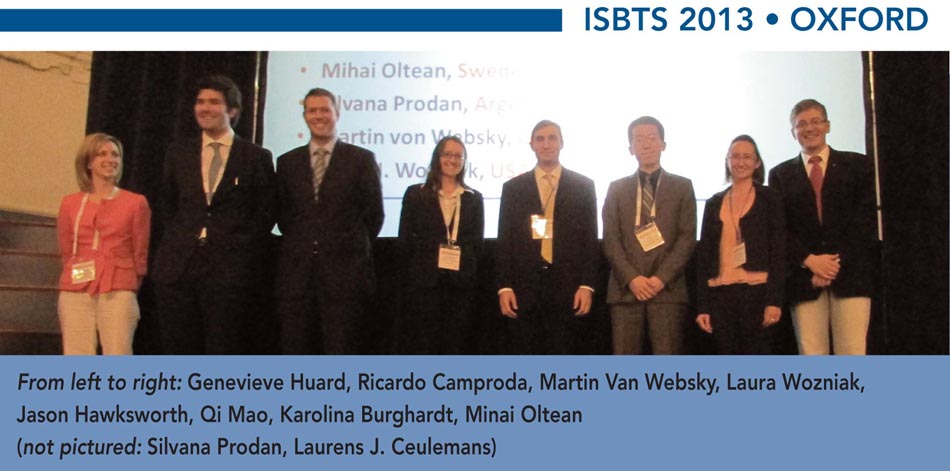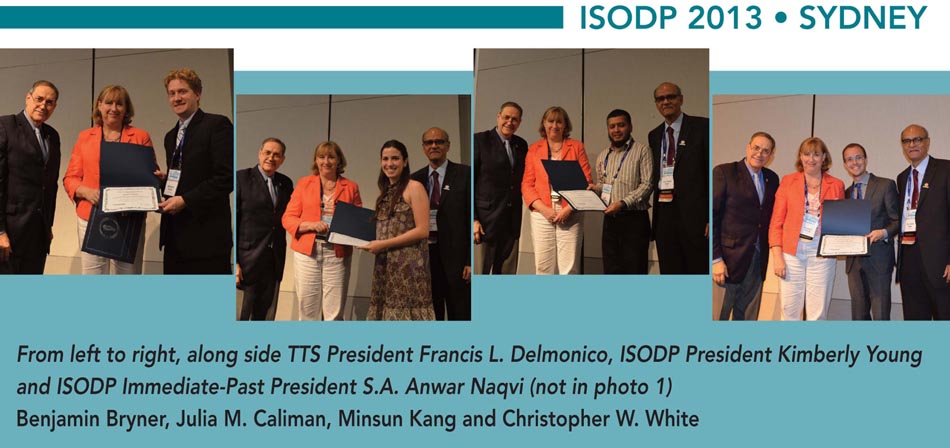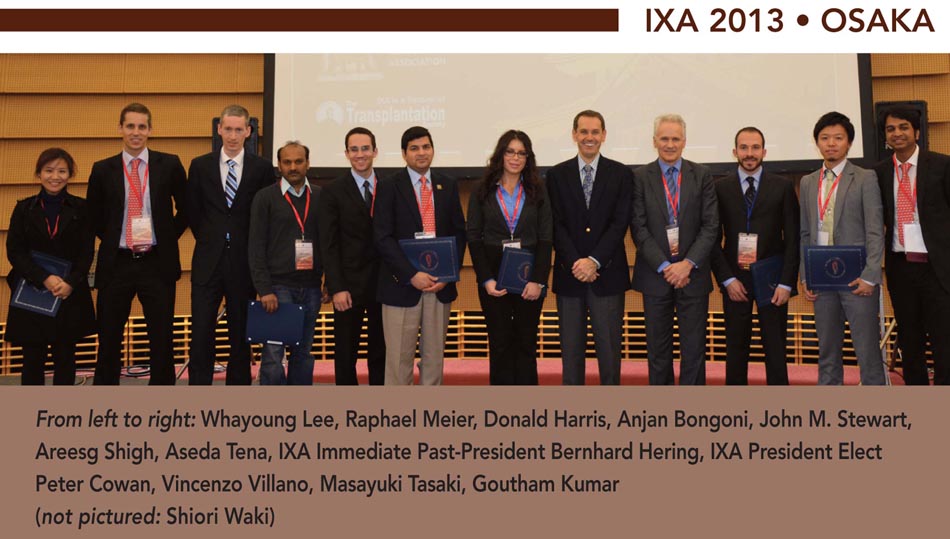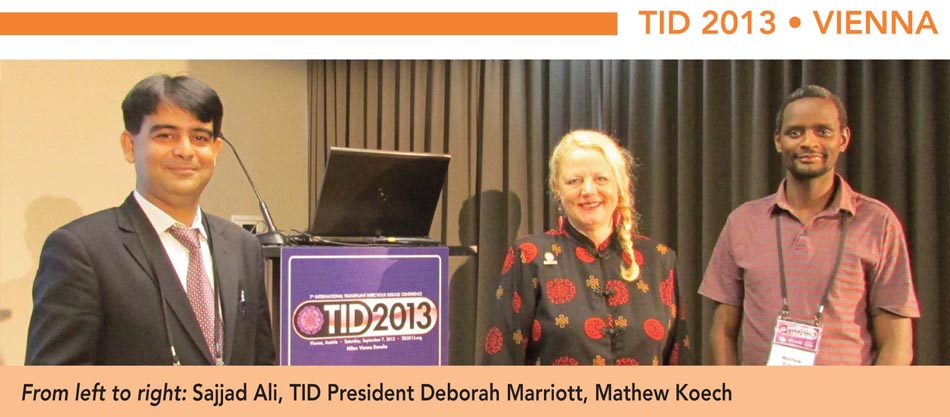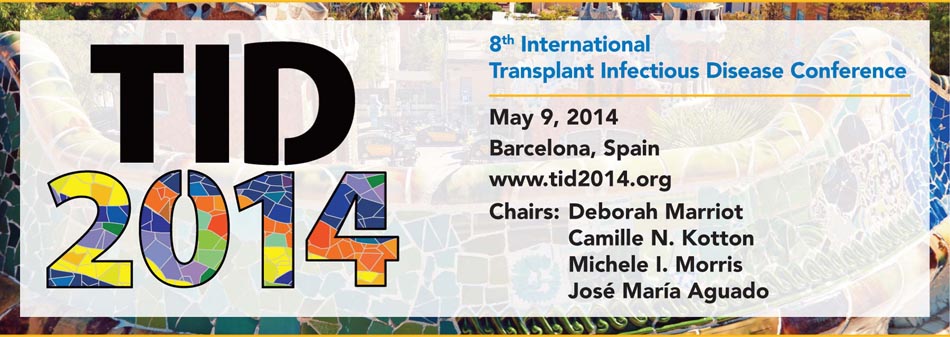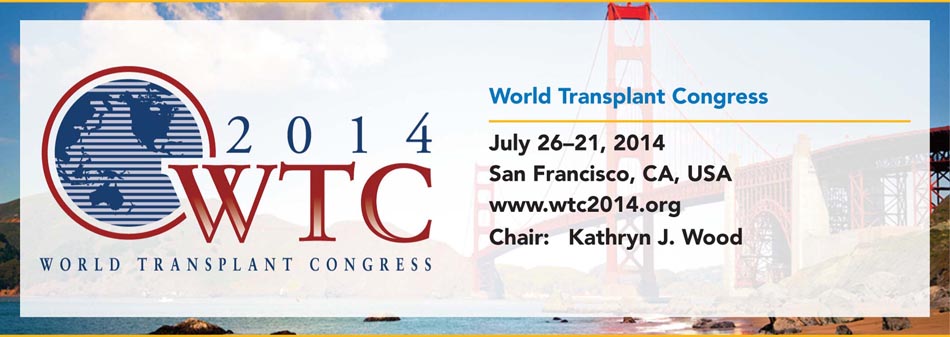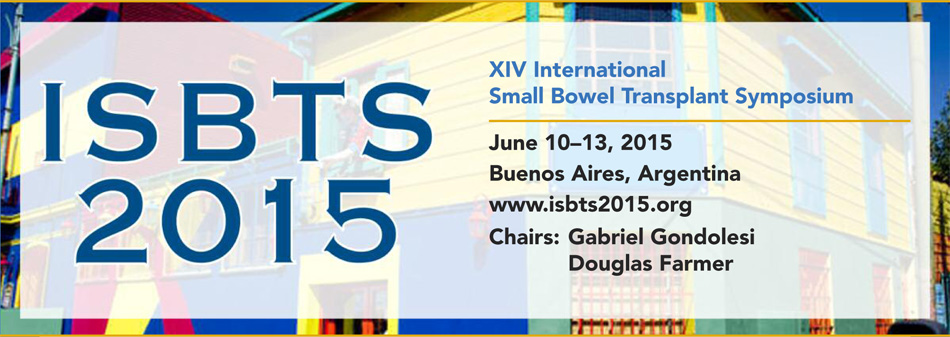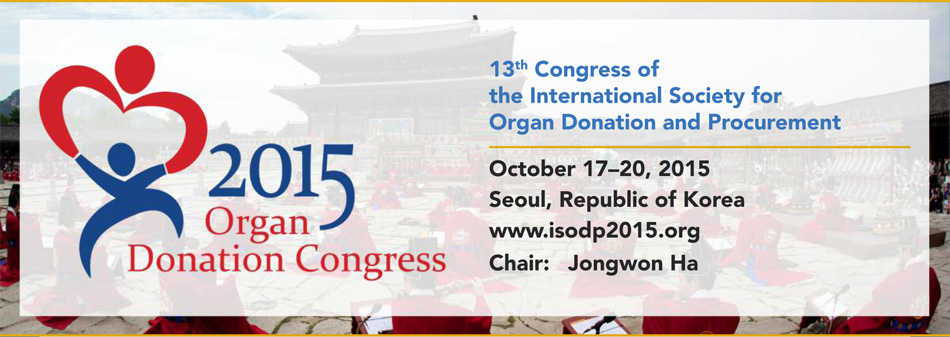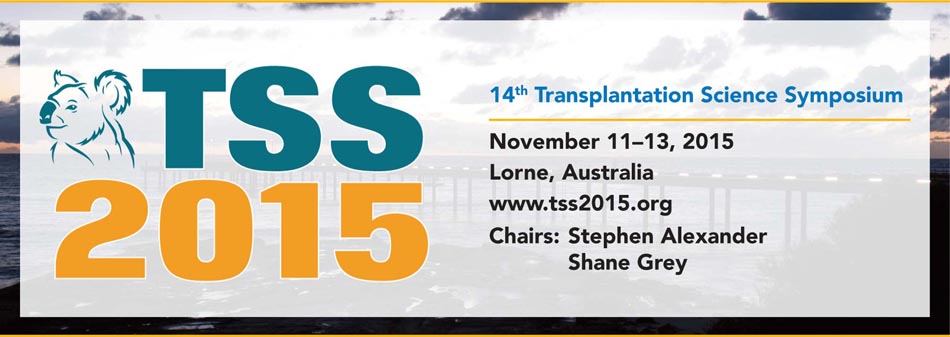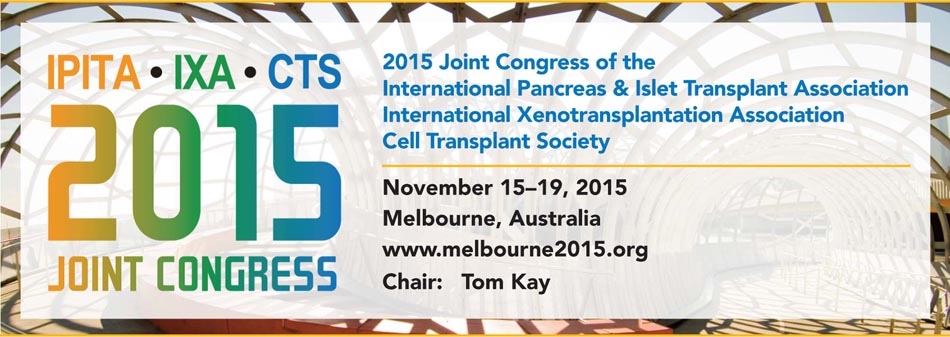Newsletter 2014 Volume 11 - Issue 1
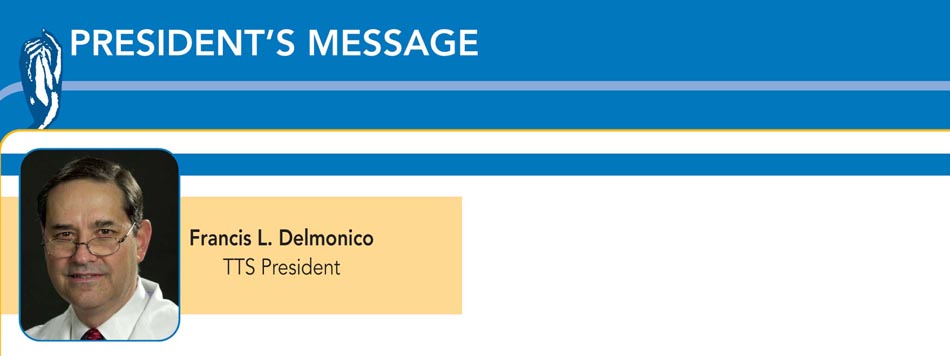
TTS AND DOI IN BOSNIA
Representing The Transplantation Society and the Declaration of Istanbul Custodian Group, Francis Delmonico shown meeting with the Prime Minister and Minister of Health of Bosnia in Sarajevo on April 3, 2014. This activity was part of the involvement of TTS and DICG with the leadership of Dr. Mirela Busic in developing deceased donation throughout Southeast Europe.
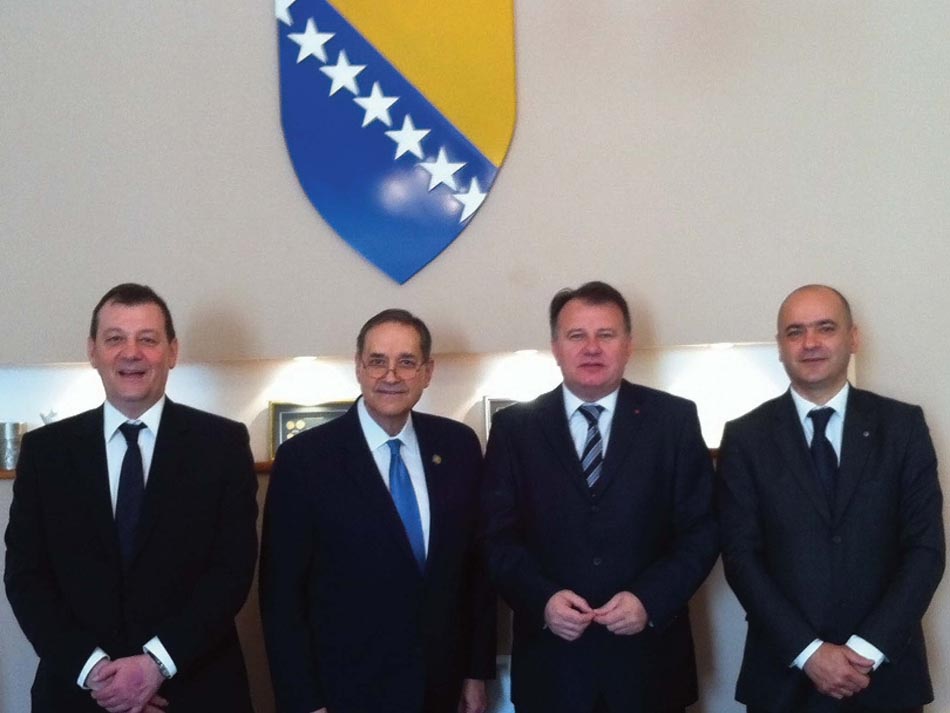
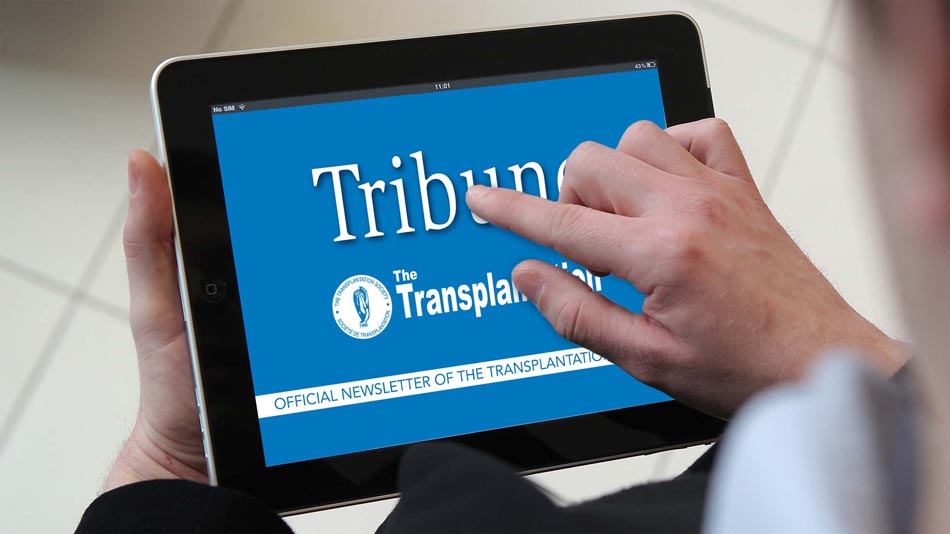
As of this issue, the Tribune will be moving from print to digital only. This will give members access anytime, anywhere – online, downloaded for unconnected access or as a PDF for printing and sharing.
WHY GO DIGITAL?
Print is just print. A digital framework allows for functionality that print simply cannot offer.
- Membership Interaction
- Content Flexibility
- Audio/Video Imbedding
At this time, the app “Newsstand” version will only be available to our Appletm device users. For other devices, we are creating an electronic .pdf version as well.
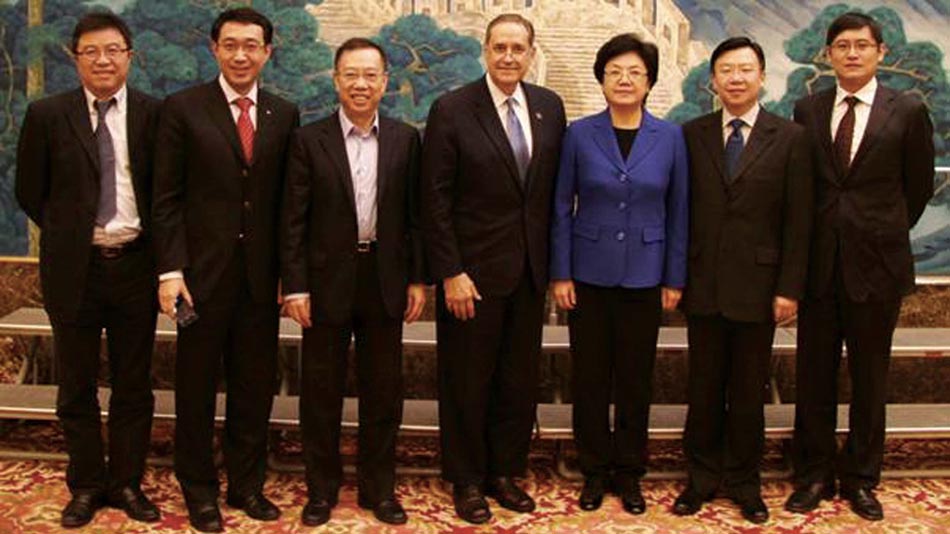
From left to right: Zhou Jun, Deputy Director-General, Department of Medical Administration, NHFPC; Wang Haibo Director, China Organ Transplant Response System Research Center (COTRS); Huang Jiefu, Head, National Organ Transplantation Committee of the NHFPC; Francis L. Delmonico, President, The Transplantation Society, Representative of the DICG, Bin Li, Minister, NHFPC; Ren Minghui, Director-General, Department of International Cooperation, NHFPC; Liu Yong Division Director, Department of Medical Administration, NHFPC
Report of Meeting with Minister Bin Li of the National Health and Family Planning Commission of the People's Republic of China
This meeting at the Ministry was arranged with much appreciation by Huang Jiefu.
Minister Bin Li initiated the discussion with a prepared statement of a five-point plan for organ donation and transplantation under the authority of the National Health and Family Planning Commission of the People’s Republic of China (NHFPC).
FIVE-POINT PLAN FOR ORGAN DONATION AND TRANSPLANTATION
- Human Organ Donation System:
The practice of human organ transplantation will be “open and transparent” by an executive order released from the NHFPC in August 2013 that requires:- transparency in the allocation of organs to a computerized waitlist (COTRS);
- the development of the organ procurement organization structure in each province;
- the training of organ donation coordinators.
This regulation of the NHFPC is aligned to the State Council directive that mandates transparency and fairness in the practice of organ transplantation in China.
-
Human Organ Procurement and Allocation System:
The implementation of an information technology system (COTRS) that accomplishes a transparent and fair practice of the distribution of deceased donor organs; -
Human Organ Transplant Clinical Service System:
The authorization of 169 transplant centers in China; -
Scientific Registry System for Human Organ Transplantation:
A registry system that will record each case of organ transplantation in China with appropriate follow-up of the recipient; -
Human Organ Transplant Regulatory System:
A regulatory authority of NHFPC that oversees the practice of organ donation and transplantation in China, referenced to 30 existing laws and regulations developed by PRC State Council and NHFPC (since 2007).
Thus far in 2013, there has been 1161 deceased organ donors (not involving the use of organs from executed prisoners) resulting in more than 2700 organ transplants — and combined with the experience of living donor transplantation, these deceased and living donor transplants now constitute 49.7% of organ transplantation in China.
Minister Bin Li expressed the resolve of the PRC Government — that the reliance of transplant centers upon organs from executed prisoners — must cease. The government of China has affirmed its commitment to prohibit transplant tourism and shutdown organ trafficking and transplant commercialism.
The five-point plan as elaborated above is to be promulgated in the upcoming conference Hangzhou (November 1-3) — releasing a Hangzhou Resolution of the commitment of NHFPC to align practices of organ donation and transplantation in China with WHO Guiding Principles and those of the Declaration of Istanbul — adopted by the World Health Assembly.
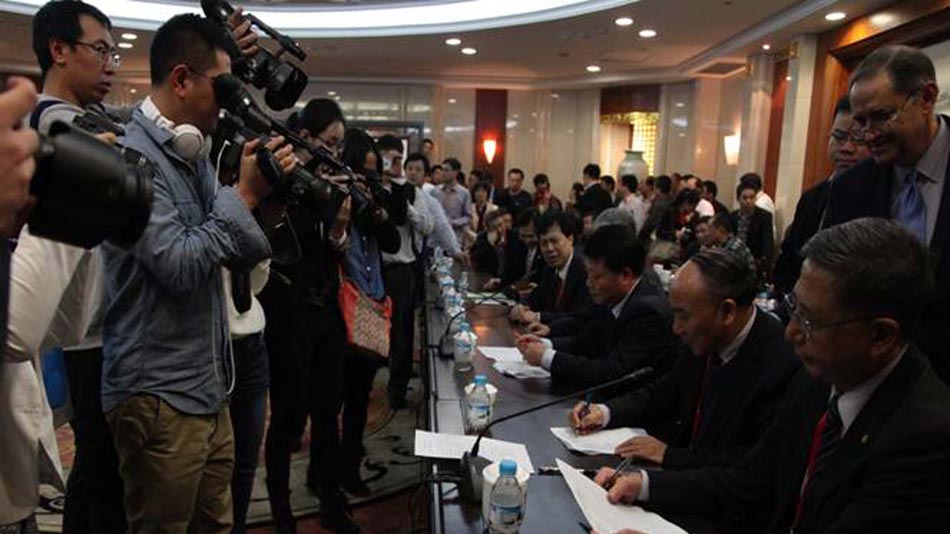
From left to right: Xiaoshun He, Vice President, The First Affiliated Hospital of Sun Yat-sen University; Shusen Zheng, President, Chinese Society of Transplantation; and Yongfeng Liu, President-elect Chinese Society of Transplantation committing their centers to fulfill the NHFPC program of Minister Bin Li.
China needs the support of the international community to implement this new system and the international community needs the involvement of China in progress of organ transplantation as a field of medicine. The Minister was concerned to learn that the experience of Chinese transplant professionals had not been either sought or accepted because of the reliance upon the use of organs from executed prisoners. However, as of this seminal interaction, she pledged her commitment to resolve that exclusion and to promote and academic exchange with international community based upon the five-point NHFPC plan elaborated, to include the cessation of the use of organs from executed prisoners and an end to the practices of organ trafficking.
A proposal was made to the Minister that NHFPC convene a meeting of the international community in China in June 2014 that would also involve the participation of the leadership of the World Health Organization The Minister accepted this proposal and plans are now underway to develop such a Congress.
The support of the NHFPC for the Hangzhou Resolution was affirmed at the meeting with Minister Bin Li (and for the leadership of Dr. Huang Jiefu and for the transparent system — COTRS that developed by Haibo Wang).
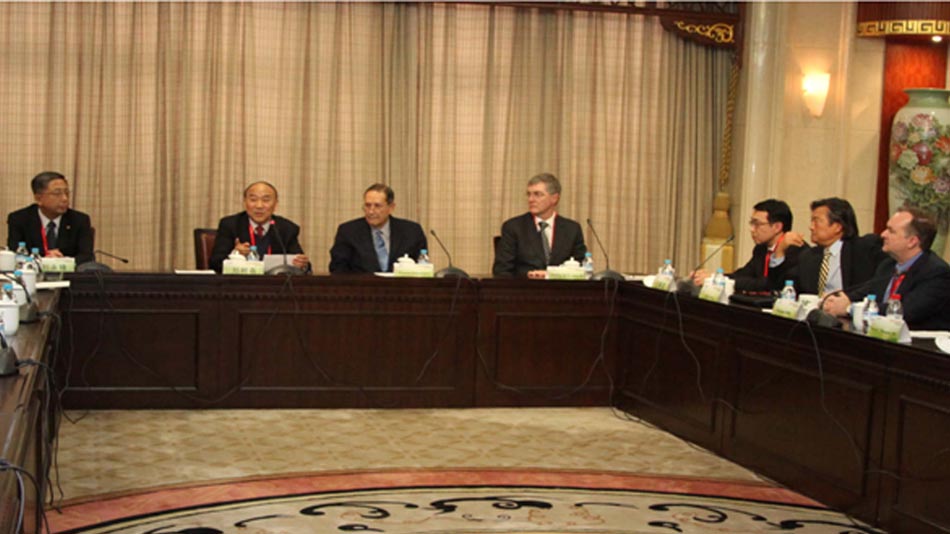
From left to right: Yongfeng Liu, President-elect Chinese Society of Transplantation; Shusen Zheng, President, Chinese Society of Transplantation; Francis L. Delmonico, Philip J. O’Connell, Haibo Wang, John Fung and Michael Millis.
On November 1, 2013, the Human Organ Transplant Committee of the National Health and Family Planning Committee (NHFPC) held the 12th OTC meeting in Hangzhou, Zhegiang, China to promulgate the Hangzhou Resolution before the 2013 China National Transplantation Congress and organized by the Chinese Organ Transplant Association. The meeting in Hangzhou featured a keynote address by OTC Head Jiefu Huang who proclaimed a "New Era for Organ Transplantation in China”.
The Resolution requires all transplant professionals to comply with the five-point plan of the NHFPC as elaborated by Minister Bin Li in accordance with State Council law. The Hangzhou Resolution aligns the practice of transplantation with China culture and to WHO Guiding Principles (and those of the Declaration of Istanbul).
Henceforth organs must be recovered from deceased donors following the national protocol for the three China categories of deceased organ donation:
- China Category I: organ donation at the brain death
- China Category II: organ donation after circulatory death
- China Category III: organ donation after brain death followed by the determination of death by circulatory criteria.
The Hangzhou Resolution concludes the reliance of transplant centers to use organs from executed prisoners. The leaders of more than 30 transplant centers came forward to immediately commit their centers to no longer use organs from executed prisoners. The names of these centers and these transplant leaders will be presented to the international community to enable the publication of data from their centers in the medical literature and their presentations at international scientific congresses.
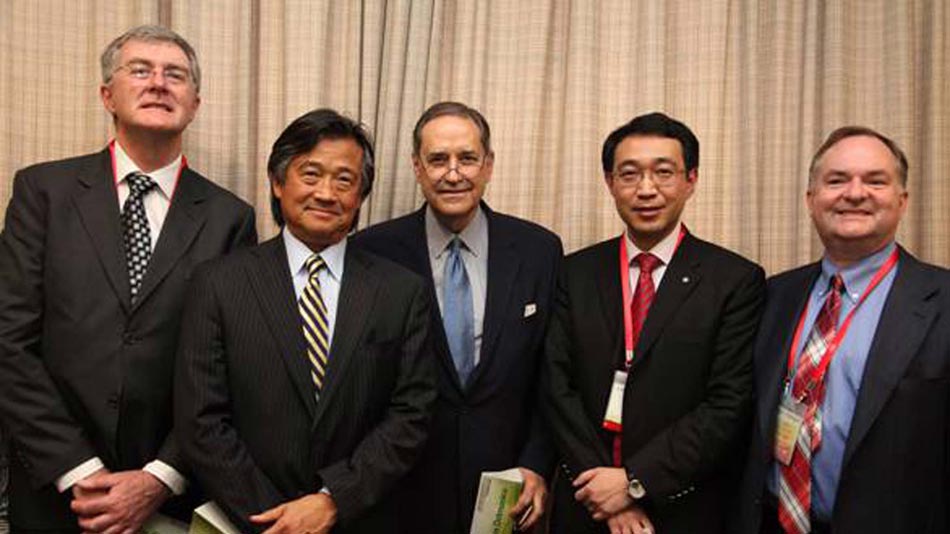
Philip J. O'Connell, John J. Fung, Francis L. Delmonico, Haibo Wang and J. Michael Millis
The support of the NHFPC of the Hangzhou Resolution is now affirmed (and for the leadership of Dr. Huang Jiefu and for the transparent system — COTRS that developed by Haibo Wang).
With the release of the Hangzhou Resolution and the engagement of those centers committed to no longer use organs from executed prisoners, the Declaration of Istanbul Custodian Group will work with Foundation support from within China to accomplish the widespread implementation of the NHFPC five-point plan throughout all the provinces of China involved with organ transplantation.
TO XI JINPING, PRESIDENT OF THE PEOPLE’S REPUBLIC OF CHINA: CHINA'S FIGHT AGAINST CORRUPTION IN ORGAN TRANSPLANTATION
The international media have recently focused attention on the resolve of China’s new leadership to combat the rampant corruption within its society. The January 13, 2014, article in the China Daily, “For a clean and fair society,” reported your guidelines for political and legal reform. The judicial system is now charged to "carry the sword of justice and scale of equality" for all of China. "The Chinese dream” you have proposed amounts to a call for a culture of human rights linking the dignity of a great nation to the dignity of each citizen. Therefore, it is timely for the international transplant community to urge China to address the unethical practices in the field of the organ transplantation as another measure of your commitment to rid Chinese society of corruption.
China is the only country in the world that still systematically takes organs from executed prisoners for the purpose of transplantation. The Transplantation Society (TTS) has expressed its strong objection to this practice through an academic embargo that prevents Chinese physicians who engage in this practice from presenting at international congresses, publishing articles in the medical literature, and achieving membership in TTS.
Why is China scorned by the international community for this practice? A fundamental principle of organ donation is that potential deceased donors must have a choice whether they wish their organs to be made available for transplantation after they die. The choice to donate should not be coerced by the prospect of execution or the fear that refusal might expose members of the surviving family to retribution by the authorities. Organs and tissues should always be given freely and without coercion, a principle articulated in the Declaration of Istanbul in May 2008 and affirmed for more than 25 years by the World Health Organization (WHO), most recently at the 63rd World Health Assembly in a May 2010 resolution adopted by all member states, including China.
Some Chinese officials contend that prisoners give “consent” before their execution. It is obvious, however, that prison inmates condemned to death are not truly free to make an autonomous and informed consent for organ donation and that no legal due process exists to assure consent. First hand reports from our Chinese colleagues and a number of investigations suggest that the practice of obtaining organs from prisoners in China involves notorious transactions between transplant surgeons and local judicial and penal officials.
Although the outcomes of this unethical practice cannot be compared to the results from other countries based on data in the peer-reviewed medical literature, the anecdotal reports of patients returning from China to their native countries with complications from clandestine organ transplants are many. For example, the physician of a 14-year-old Saudi national who received an executed prisoner’s kidney in Tianjin returned home with the transplant never functioning. A biopsy of the kidney showed it to be obsolescent and scarred, and thus never suitable for transplantation. This teenage patient, who contracted a viral disease that the Chinese transplant team should have prevented or at least treated, died within weeks of the transplant. The procedure evidently cost her mother US$200,000. There was no redress, no accountability, and no assessment of performance associated with this illegal and unethical procedure.
The Tianjin website (www.cntransplant.com) continues to recruit international patients who are seeking organ transplants. Cases like those of the Saudi girl are illustrative of the financial gain for those supplying and transplanting organs from executed prisoners. The underlying abuse by these medical professionals and widespread collusion for profit are unacceptable.
Modern day China arose from one of the oldest civilizations in the world, and its people have inherited a unique and great culture. Ancient Chinese civilization influenced the world before; by becoming a responsible member of the global transplant community, modern day China can do so again. The special importance of China’s role in organ transplantation globally is bolstered by China’s prominence on the world stage as a permanent member of the UN Security Council. Social justice, safeguarded by the law, should play the same role in China as elsewhere. Regrettably, China’s attempt to develop an ethical organ transplantation program is undermined by the corrupt practices of doctors and officials who obtain organs from executed prisoners illegally for sale to wealthy foreign patients from around the world.
WHO and TTS were closely associated with the development of the Human Organ Transplantation Regulation before its final approval by the State Council of China in 2007. The new national program was described in 2013 in an article, “The National Program for Deceased Organ Donation in China,” in Transplantation, the Society’s official journal (Huang J, et al Transplantation. 2013 Jul 15; 96: 5-9). This policy has been welcomed by the international community as an alternative to the still-continuing practice of recovering organs from prisoners sentenced to death.
Recently, TTS representatives were invited participants at two important meetings sponsored by the Chinese National Health and Family Planning Commission (NHFPC) held on November 1–2 and November 17, 2013, in Hangzhou and Changsha, respectively, to propel ongoing organ transplant reform. The Hangzhou Resolution, which is now posted on the NHFPC website, elaborates a legal framework for the oversight of the practice of organ donation and transplantation in China that establishes credentials for Chinese transplant professionals, bans the purchase and sale of human organs, prevents organ trafficking and transplant tourism, and promotes treating transplantable organs as a national resource for Chinese patients as a means of achieving national self-sufficiency in transplantation. Following the pronouncement of the Hangzhou Resolution, over 38 hospitals voluntarily signed an agreement to immediately stop using executed inmates' organs and to strictly abide by the newly released NHPFC regulations. This development is an encouraging step towards an open, just and ethical organ transplantation system in China. TTS supports these measures implemented for organ transplant reform in China in the last few years, which are moving in the right direction under the leadership of Professor Huang Jiefu, the former Vice Minister of Health, who has been tasked with reforming China’s transplant system.
Nonetheless, TTS remains skeptical about the enforcement of Chinese government policy and law. Chinese media report that even as the new program is being piloted, it has already been infiltrated by persons driven by the same corrupt practices who have assumed authority for the distribution of organs. A report in the New York Times on November 10, 2013, “No quick fixer,” describes Chinese Red Cross officials confronting hospitals over organs in a manner contrary to the NHFPC regulation that mandates all organs be allocated through the Chinese national organ allocation computer system. Further, the fact that foreign patients are still undergoing transplantation in China suggests that some hospitals are boldly and irresponsibly violating Chinese government regulations, thereby rendering the law a mere “paper tiger.” These centers are both jeopardizing the public trust at home and tarnishing China's reputation on the international stage.
Thus, we ask the Chinese Government for an immediate and sustained resolve, to monitor compliance by Chinese professionals in performing organ donation and transplantation in accordance with NHFPC and international standards. The fledgling national organ allocation computer system which has been developed must be authorized as the sole distributor of organs to ensure transparency and fairness. Otherwise, the perception will be that one corrupt system of organ donation in China has simply been replaced by another.
As the government under your leadership has stepped up its fight against corruption, a favorable domestic and international environment has now been created for Chinese medical professionals to establish an ethical and internationally respectable national organ donation and transplantation system. Resolving this decades-long malpractice would not only would improve China’s image in the world but also give China legitimacy in advancing the field of transplantation throughout Asia. China can position itself on the world stage by contributing to the development of transplantation globally and by ensuring that this life-saving medical practice provides maximal benefit to the Chinese people in an indisputably ethical manner.
On behalf of
The Transplantation Society
www.tts.org
and
the Declaration of Istanbul Custodian Group
www.declarationofistanbul.org
Francis L. Delmonico, M.D. |
Gabriel M. Danovitch, M.D. |
Jeremy R. Chapman, M.D. |
Adeera Levin, M.D. |
John J. Fung, M.D. PhD |
Ronald W. Busuttil, M.D. PhD |
Alexander M. Capron, LL.B |
Philip J. O'Connell, M.D. |
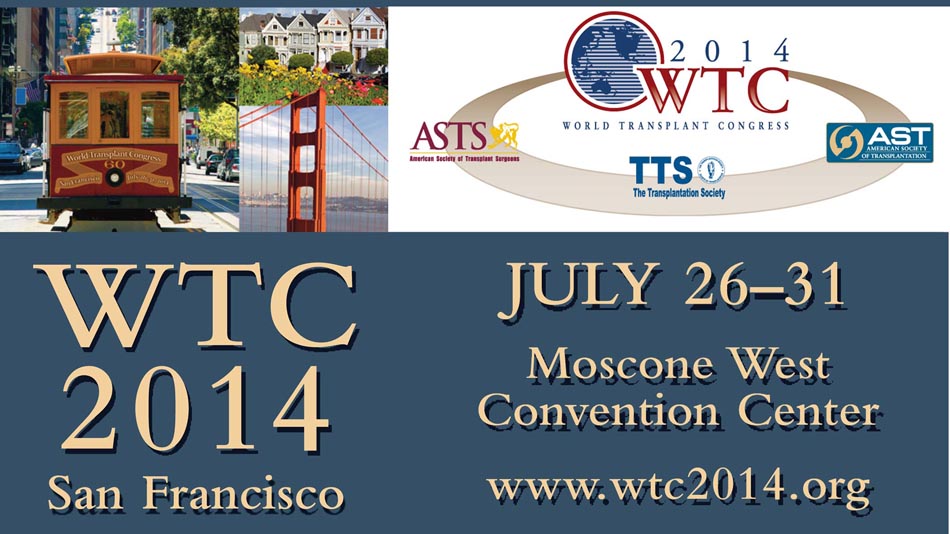
WELCOME FROM THE CONGRESS CHAIR
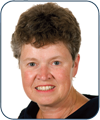 |
Kathryn J. Wood, DPhil |
Following the tremendous success of the 2006 World Transplant Congress that took place in Boston, The Transplantation Society (TTS), the American Society of Transplant Surgeons (ASTS) and the American Society of Transplantation (AST) agreed to join together again this year. Selected as the host site for this record-breaking event in transplant medicine, is one of the top travel destinations in the world: San Francisco, California, USA. From July 26–31, WTC 2014 will welcome transplant scientists, physicians, surgeons, trainees, nurses, organ procurement personnel, pharmacists and other associated transplant professionals from around the world.
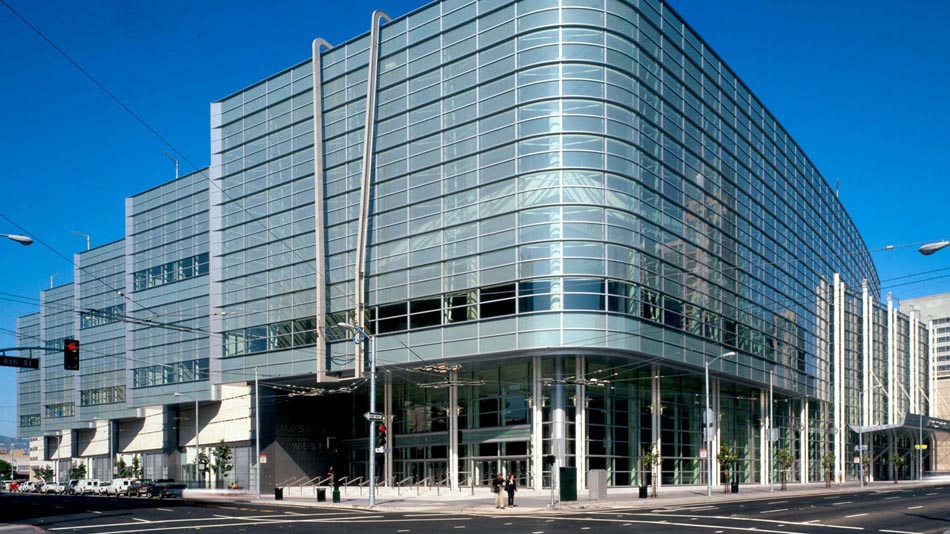
Moscone West Convention Center
The Programme Planning Committee has developed a stellar programme, beginning with two full days of topic-focused symposia on Saturday, July 26th and Sunday, July 27th. These symposia will offer a variety of pre-meeting courses for clinicians, scientists and allied health professionals dedicated to current topics of major interest in the science and clinical practice of transplantation. These courses have been designed specifically to provide educational opportunities for everyone working in the field of transplantation worldwide.
PRE-MEETING COURSES FOR CLINICIANS, SCIENTISTS AND ALLIED HEALTH PROFESSIONALS
Also on Sunday, WTC has joined with our international society partners, the International Pediatric Transplant Association, International Society of Heart and Lung Transplantation, International Liver Transplantation Society and the International Transplant Nurses Society to develop symposia of specific interest to these specialties.
The programme for Sunday culminates in the Opening Ceremony (there are surprises in store) followed immediately by the Networking Event in the Exhibit Hall; as always, an opportunity to make new acquaintances as well as meet old friends and colleagues. The Scientific Programme runs over four days and will cover all aspects of the latest developments in the science and clinical practice of transplantation. The highlights are summarized by TTS President-Elect, Philip J. O’Connell in the subsequent article.

California Academy of Science
On Wednesday, July 30th, WTC will sponsor a closing networking event; chosen by the Congress Executive and Planning Committees, the California Academy of Sciences – among the largest museums of natural history in the world – will host this special evening. The Academy was founded in 1853 as a learned society and it continues to carry out a large amount of original research. Exhibits and education became significant endeavors of the museum during the 20th Century. Located in Golden Gate Park and completely rebuilt in 2008, the building covers 400,000 square feet (37,000 square metres) and is among the newest natural history museums in the United States. The museum and all the exhibits will be open exclusively for the WTC attendees and their families to tour, celebrate with music and enjoy a variety of great San Francisco cuisine.
On behalf of the WTC 2014 Executive Committee, I look forward to seeing and welcoming you all to San Francisco.
Kathryn J. Wood, DPhil
Congress Chair
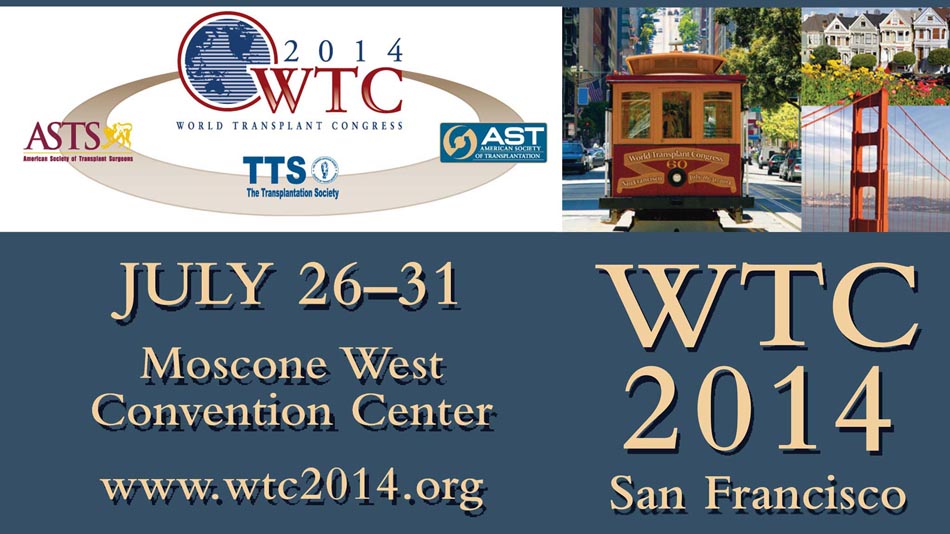
SCIENTIFIC PROGRAM HIGHLIGHTS
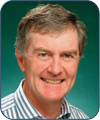 |
Philip J. O’Connell MD, PhD |
The 26th July of this year will be the start of the World Transplant Congress in San Francisco – the joint meeting of The Transplantation Society (TTS), The American Society of Transplantation (AST) and The American Society of Transplant Surgeons (ASTS). The Scientific Program has been developed by key opinion leaders from all three societies coordinated by a Program Committee of six individuals; Dirk Kuypers and myself represent TTS.
There has been an outstanding level of cooperation at all levels of the Program Committee to ensure that a high-impact program, which is representative of the international transplant community, will be presented. The meeting brings together the best Science and Clinical Research in the field, beginning with Pre-meeting Symposia with a strong emphasis on education. In all, there are 18 Pre-meeting Symposia, 4 full-day and 14 half-day, with a strong input in the program development by several international societies, including ILTS, ISHLT, IPTA, and international and American transplant nurse and donor coordinator associations. The program caters to a wide range of interests and expertise, from trainees to expert clinicians. For those interested in clinical trials and immunosuppression protocols, there is an exciting Pre-meeting Symposium on “The Future of Transplant Immunosuppression R&D: Problems and Solutions from Clinical, Biopharmaceutical and Regulatory Perspectives”. This symposium has brought together clinicians, regulators and representatives of the pharmaceutical industry to identify solutions to the road-blocks in the development of new immunosuppressive agents for transplantation.
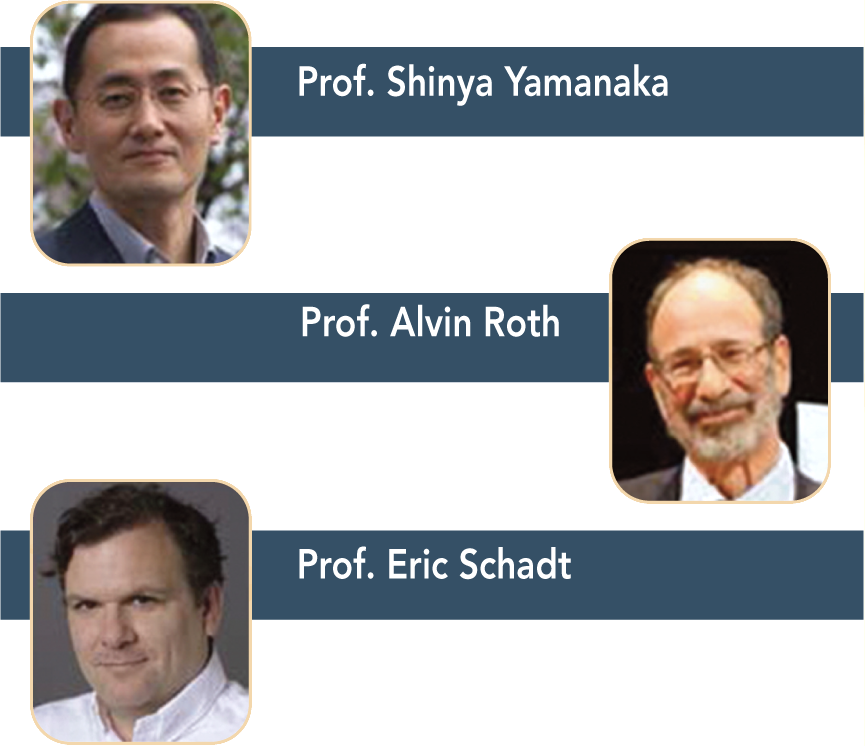
The meeting proper, which starts on Monday 28th July, caters to a wide range of interests: there are 4 Plenary Sessions, 42 Sunrise Symposia, 36 State-of-the-Art Symposia, 98 Free Communication Sessions and 2281 poster presentations. Two of the plenary speakers are Nobel Laureates: Professor Shinya Yamanaka, Director of the Centre for iPS Cell Research and Applications at Kyoto University; and Professor Alvin Roth, Professor of Economics at Stanford and Harvard University. The third invited plenary speaker is Professor Eric Schadt from the Department of Genetic and Genomic Sciences, Mount Sinai Medical School. Professor Schadt has used state-of-the-art genomics to identify multiple therapeutic drug targets and will talk about some of the exciting new research tools in our quest for understanding complex biological systems such as transplantation. The final plenary talk on the Thursday is the popular “What’s Hot - What’s Not” formula, which will summarise what will be a forward-looking program that will set the scene for transplantation clinical practice and research for the next decade. The full program is available on the Congress website at www.wtc2014.org and I urge you all to take a look. You will find there is something for everyone, regardless of your interests.
The WTC Program Committee looks forward to seeing you in San Francisco for what will be an outstanding meeting.
Philip J. O’Connell, MD, PhD
TTS President-Elect
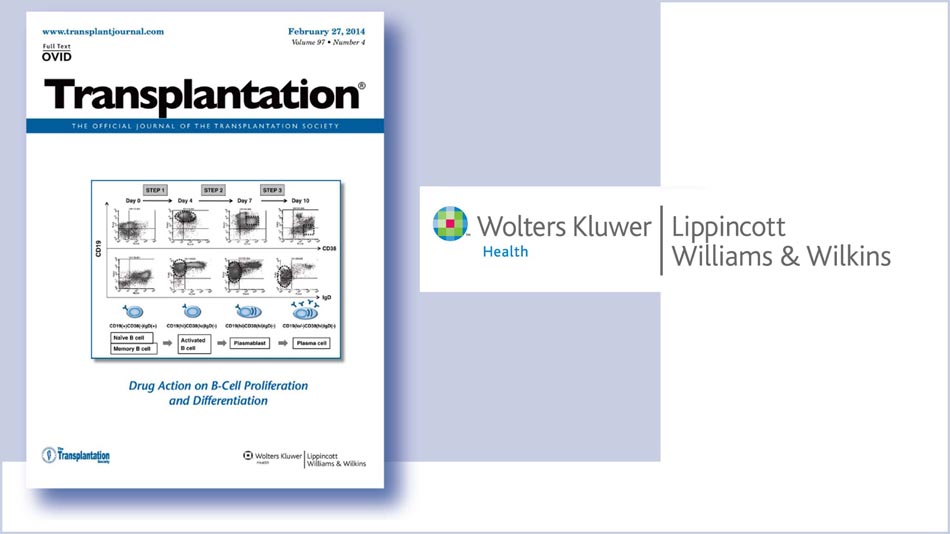
INTRODUCING THE NEW E-I-C TEAM
The Transplantation Society and Wolters Kluwer are delighted to announce the new Editor-in-chief, Clinical Sciences Editor, Basic Sciences Editor and Special Features Editor for our journal Transplantation®: Jeremy Chapman, Jonathan Bromberg, Carla Baan, and Stefan Tullius, respectively. The new team will be receiving all the submissions after July 1st 2014 and will be responsible for the issues of the journal from January 1st 2015.
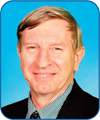 |
Jeremy R. Chapman - Editor-in-ChiefKnown to many as a Past President of TTS and joint editor of Transplantation Reviews, Jeremy feels he may be the only one who doesn’t really know how much work this job involves, but is looking forward to the challenges of the new era in publishing scientific literature. |
 |
Jonathan Bromberg - Clinical Sciences EditorRecent deputy editor of AJT, Jonathan is very active clinically in kidney and pancreas transplantation and is currently chief of his transplant division. He has active and funded projects in basic, translational, and clinical transplantation. |
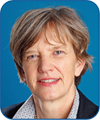 |
Carla Baan - Basic Sciences EditorCarla is very well known both for her research work and as past President of ESOT. She comes to the role determined to ensure the highest standards of publishing for the basic research which drives the field forward. |
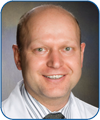 |
Stefan Tullius - Special Features EditorKnown to many through his previous involvement with the Board of ESOT and current work as TTS Councilor and Co-Chair of TTS’ Transplantation Science Committee, Stefan has a broad clinical and basic research interest in organ transplantation and is looking forward to be contributing with exciting and novel topics in his role as Special Feature Editor. |
DEPUTY EDITORS
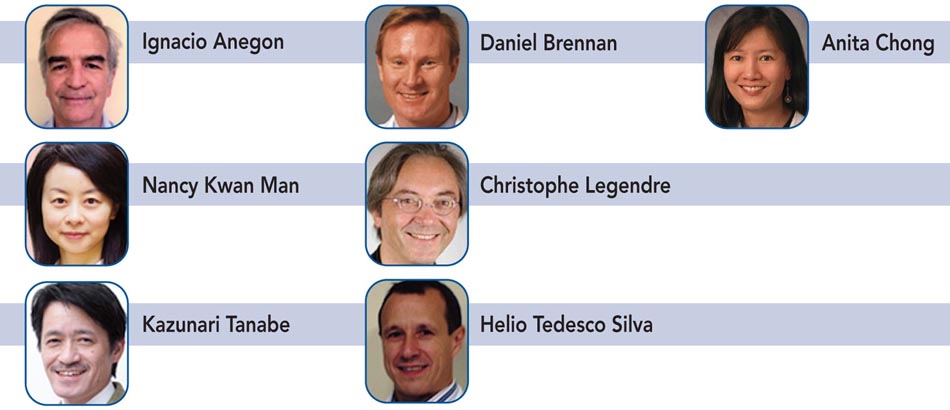
It isn’t just the editorial team that will be changing. There will be a new submission site and a new look across a number of features of the journal. What won’t change is the approach to excellence in the most cited journal in the field of transplantation. The new team will be working hard to make sure you have immediate access to the most up to date information and ground breaking science that impacts on your work.
Have you tried the iPad app? If not then all you have to do is only a click away...
Transplantation for the iPad
Did you realize that when you access a paper through the Transplantation website as a member, it is not only free but you also access a great search program and all the other added features of the journal: if you haven’t tried it just click here…
Transplantation Journal
You will then be able to search by issue, article or even by collection based on specific subjects.
Watch this space for more news on innovation in your journal. Watch also for the tributes to the outgoing editors who have – and will continue throughout 2014 – to put amazing amounts of energy and expertise into the journal. We all owe them a huge debt of gratitude for the standards and substance of the journal today.
Referees are the heart of any journal and more than 2,000 people have contributed over the past year or two. This task won’t change either. If you have been a referee your details will be transferred to the new submission site. If you haven’t been involved so far and are interested in refereeing for the journal, please send your information here to begin the process.

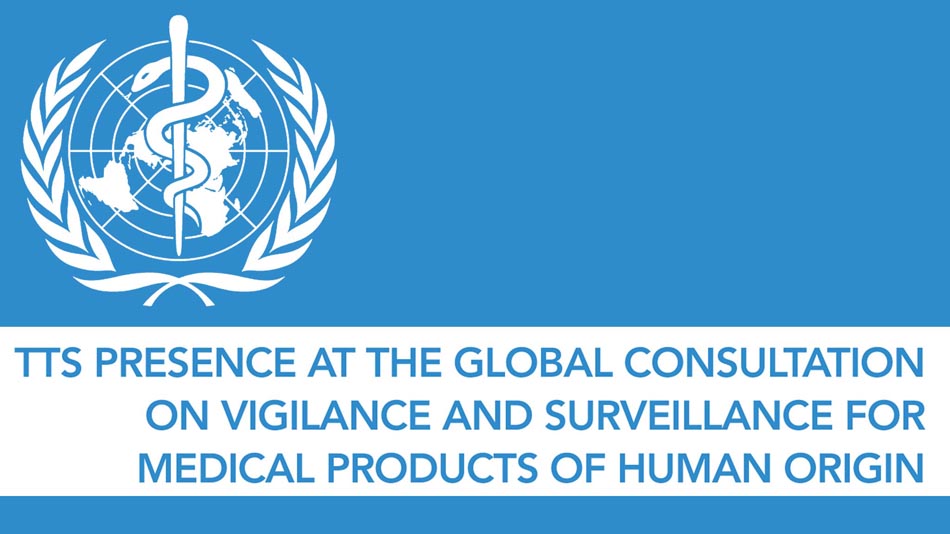
From the 7–9th of December 2013 I had the privilege of representing TTS at the WHO Global Consultation on Vigilance and Surveillance for Medical Products of Human Origin. At the consultation, the Notify Library was officially launched and, with its success, transplantation has spread beyond solid organ transplantation to include the transplantation of an ever-expanding array of tissues and cells. Furthermore, transplantation is expanding rapidly in developing countries. Transplantation has always carried with it the risk of disease transmission, especially infection and malignancy. With examples of disease transmission involving newly identified infective agents and transplantation now occurring in areas, which have different disease burdens, it is becoming increasingly difficult to keep abreast of disease risks posed by transplantation – hence, the need for a project such as the Notify Library.
The Notify Library provides a second layer of surveillance above that already offered by the various national regulatory authorities that oversee vigilance and surveillance in this area. More than three years in development, it provides a summary of published verifiable cases where disease transmission has occurred not only in organ transplantation but also in other medical products of human origin including assisted reproduction technology. Before being uploaded onto the Library, selected articles are reviewed by expert panels for relevance and veracity. Providing an important resource of novel and insightful cases of disease transmission associated with transplantation, the Library is an excellent resource for identifying donor diseases and conditions that can be transmitted by transplantation and is an important additional tool in evaluating transplantation risk. This is particularly true in regions where national regulatory oversight and surveillance is less well developed and these decisions remain more in the hands for clinicians. The major events that are highlighted by the Notify Library are serious adverse reactions involving infectious, malignancy or breaches of process.
...IT IS BECOMING INCREASINGLY DIFFICULT TO KEEP ABREAST OF DISEASE RISKS POSED BY TRANSPLANTATION – HENCE, THE NEED FOR A PROJECT SUCH AS THE NOTIFY LIBRARY.
In 2014 the Library plans to add a new section involving ethical breaches. This new field is important for several reasons: not only is it imperative that donated human organs be treated with respect and in an ethical way, but ethical breaches usually occur outside of regulatory oversight and hence place affected recipients at increased risk of serious adverse reactions.
I urge you all to visit the Notify Library at www.notifylibrary.org. It is an open access tool with over three thousand articles covering serious adverse reactions involving tissues, cells and organs of human origin.
Philip J. O’Connell, MD, PhD
TTS President-Elect
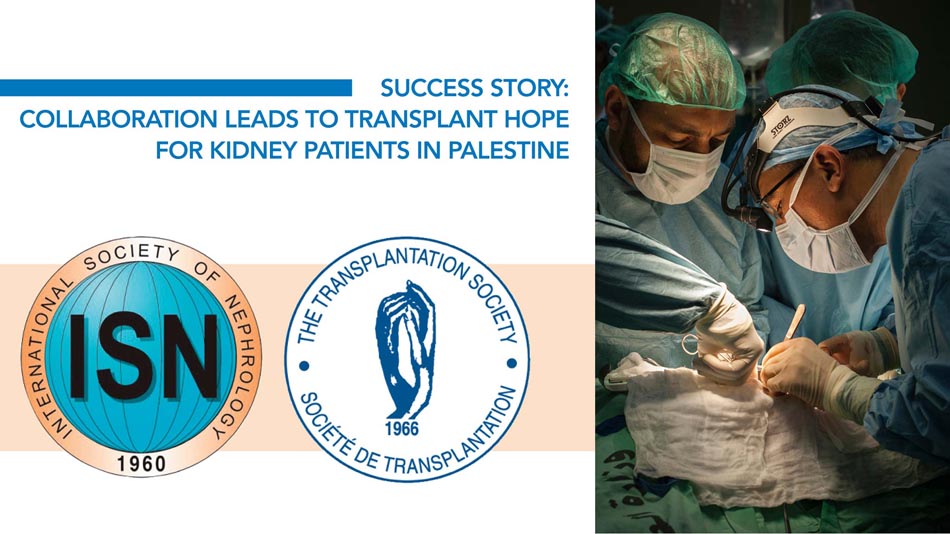
Until recently, there were no transplant services available in Gaza. About 500 adult patients and 20 children were on chronic hemodialysis and only those who could afford to travel away could benefit from this treatment.
Change is on the horizon now thanks to the ISN-TTS Sister Transplant Center Program. A partnership between the Al Shifa Hospital in Gaza, Palestine and the Royal Liverpool University Hospital in the UK led to the first kidney transplant in the region in January 2013 – giving the Liverpool team the credibility to influence decision makers regarding transplantation in Gaza.
The team just returned from Gaza where three kidney transplants were carried out, including one on a child. This has increased the total to eight transplants, three of them being pediatric. Abdul Hammad from the supporting center in the UK explains that a plasma exchange technician also helped train staff: “We started a Renal IT system, and hopefully once these are installed in every nephrology center in Gaza we can start a Renal Registry, a national transplant waiting list for kidney transplantation.”
“The Clinical Director at the Liverpool Transplant Unit has already initiated direct engagement with the Gaza Ministry of Health, Critical Care Speciality, and Members of the Legislative Council, to build the framework for organ donation,” say ISN-TTS Sister Transplant Center Program Chairs Paul Harden and Jeremy Chapman.

Previously there were high rates of mortality for dialysis patients in Gaza, especially during the war. “These patients may receive what is in many westernized countries a ‘life enhancing operation’, but in Gaza it will undoubtedly be a ‘life-saving operation,“ says Hammad whose next trip will be in April 2014.
The ISN-TTS Sister Transplant Center Program is a recent joint partnership between the International Society of Nephrology (ISN) and TTS to create new kidney transplant programs in emerging countries. For more information click here: ISN-TTS Sister Transplant Center Program.
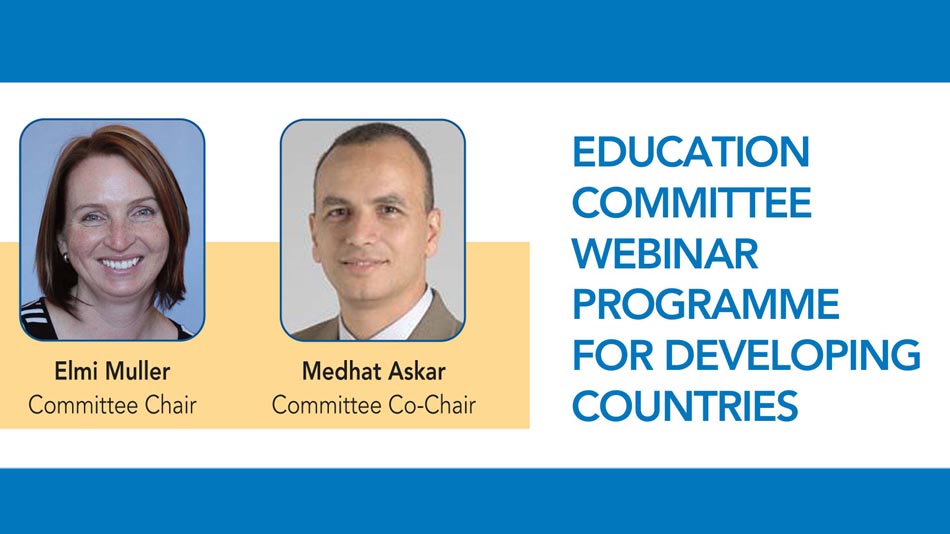
The Education Committee is putting together a series of webinars for new transplant centres who are starting off in the field or who are interested in expanding their current transplant programmes.
The series will comprise of a weekly online webinar, which will have a speaker and a moderator. After the webinar there will be time for delegates to ask or type questions. This is a good way to get immediate discussion and interest from the audience.
However, if you are unable to join the webinar at the scheduled time, the webinar will also be downloadable from the TTS website.
We hope that many of the people starting off in the field of transplantation will be interested in this programme.
The finalized programme with scheduled times will be circulated to TTS members soon.
LECTURE 01 • ONLINE NOW!
THE SOCIO-ECONOMIC BENEFITS OF TRANSPLANTATION AND THE BURDEN OF END-STAGE KIDNEY DISEASE IN SUB-SAHARAN AFRICA
SPEAKER: SARAH L. WHITE • MODERATOR: DAVID THOMSON
LECTURE 02 • ONLINE NOW!
THE ROLE OF THE WHO AND PERSPECTIVE ON TRANSPLANTATION IN AFRICA
SPEAKER: LUC NOËL
LECTURE 03 • ONLINE NOW!
MINIMUM REQUIREMENTS FROM AN INFECTIOUS DISEASE PERSPECTIVE
SPEAKER: CAMILLE N. KOTTON • MODERATOR: ELMI MULLER
LECTURE 04 • ONLINE NOW!
TISSUE TYPING: LABORATORY REQUIREMENTS FOR TRANSPLANTATION
SPEAKER: MEDHAT ASKAR • MODERATOR: CLIVE GRAY
LECTURE 05 • MAY 12, 9:00 AM (MONTREAL TIME - UTC/GMT -5 HOURS)
DCD - AN OPTION FOR COUNTRIES WITHOUT BRAIN DEATH PRACTICES
SPEAKER: MARTÍ MANYALICH
The TTS Education Academy completed presenting the distinguished educator certificate webinar series in January 2014 and those who completed the program were award the TTS Distinguished Educator Certificate. However, it is not too late to join the program and qualify for the Certificate by listening to the archived recordings of these webinars freely available for all TTS members on the TTS website (www.tts.org/academy). The Education Committee also conducted an online anonymous survey of the membership on the perception of their competency as educators, need for such courses and reasons for non-attendance. The results are currently being analyzed and will be published on the TTS website.
EDUCATION ACADEMY RECORDINGS AVAILABLE ONLINE NOW!
LECTURE 01 • EXPERIENTIAL LEARNING AND LEARNING STYLES
DR. ALICE KOLB & DR. DAVID KOLB
LECTURE 02 • SYSTEMS APPROACH TO PROFESSIONAL HEALTH CARE EDUCATION
DR. THOMAS ARETZ
LECTURE 03 • 21ST CENTURY CURRICULUM DESIGN: FOSTERING EXPERTISE THROUGH EXPERIENTIAL LEARNING AND FEEDBACK
DR. SHARON K. KRACKOV & DR. HENRY POHL
LECTURE 04 • MAKING ASSESSMENT MEANINGFUL TO LEARNING
CEES P.M. VAN DER VLEUTEN
LECTURE 05 • THE SKILLS YOU NEED TO BE AN EXCELLENT TRAINER OR TEACHER IN THE 21ST CENTURY
DR. RONALD HARDEN
LECTURE 06 • INTERACTION IN PROBLEM-BASED LEARNING TUTORIALS: GETTING IT RIGHT
DR. SAMY A. AZER
LECTURE 07 • USING TECHNOLOGY AND SOCIAL MEDIA FOR LIFELONG LEARNING
DR. NEIL MEHTA
LECTURE 08 • STRATEGIES FOR INTERACTIVE LARGE GROUP CASE PRESENTATIONS
DR. ELIZABETH ARMSTRONG
LECTURE 09 • INTER-PROFESSIONAL EDUCATION
DR. HIDEOMI WATANABE
LECTURE 10 • INNOVATIONS IN PROFESSIONAL HEALTH CARE EDUCATION
DR. PRICE KERFOOT
LECTURE 11 • CURRENT STUDIES IN MEDICAL EDUCATION: WIWIKS (WHAT I WISH I KNEW SOONER)
DR. KLARA PAPP
LECTURE 12 • THE ESSENTIAL NATURE OF SCHOLARSHIP: ADVANCING THE PRAXIS OF TEACHING, PUBLISHING, AND PROMOTION
DR. STEWART MENNIN
Are you interested in guiding the future direction for the TTS educational activities? If so please join participants of the TTS Education Academy in an informal get together during the WTC in San Francisco (RSVP by email to askarm@ccf.org).
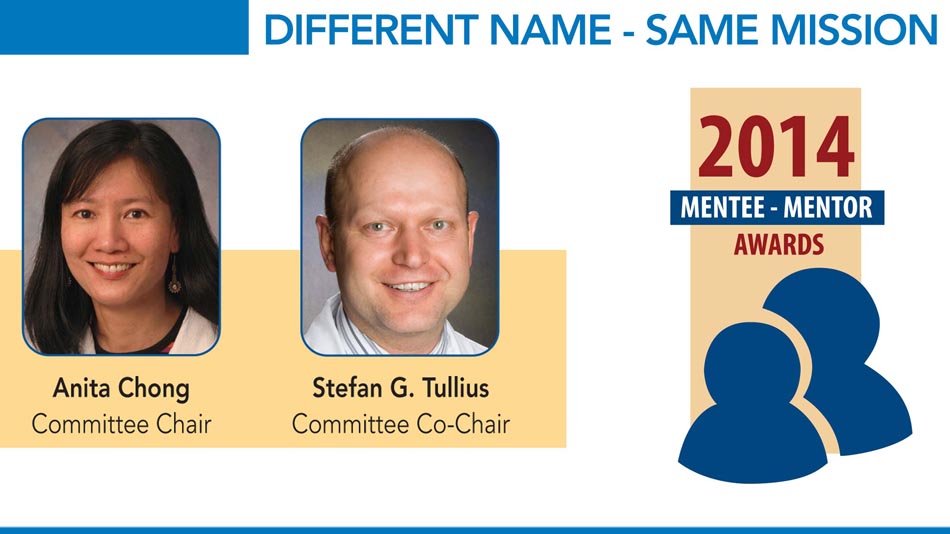
The Basic Science Committee has changed its name! Some of you may be reminded of the ‘Artist-Formerly-Known-as Prince’. Not quite right: The Basic Science Committee (BSC) has been changed to ‘Transplantation Science Committee (TSC)’, a timely change to more appropriately reflect the breadth of research within the TTS.
Coming off the successful Basic Science Meeting in Paris, the TSC is proud to continue its tradition of awarding Mentor/Mentee Awards at the 2014 World Transplant Congress. We are extremely pleased to be collaborating with a broad range of international and national societies.
TTS will jointly sponsor four Mentor/Mentee Awards with the ILTS; 2 awards each with the Canadian, French, German, Japanese and Thai societies, and ISHLT, and TSANZ; 1 award will be jointly sponsored with ESOT. In addition, to 2 other awards will be sponsored by TTS. The award ceremony will be taking place during the TSC’s Networking Event in the presence of both mentor and mentee.
In addition to the WTC Networking Event, the TSC is excited to organize a workshop in collaboration with The ONE Study (www.onestudy.org) to discuss a new initiative on developing a Global Virtual Laboratory (GVL). This initiative has the goal to enable the development of standardized protocols for immunological and genetic monitoring of human transplant recipients with real-time feedback and opportunities for training. The organizers believe that a standardization of a defined set of immunological and genetic protocols will be enormously beneficial to the global transplant community by implementing carefully validated protocols developed by The ONE Study and other large clinical trial consortia, and allowing for meta-analysis across individual studies and countries.
We are looking forward to seeing you at the WTC and during our Networking Event!
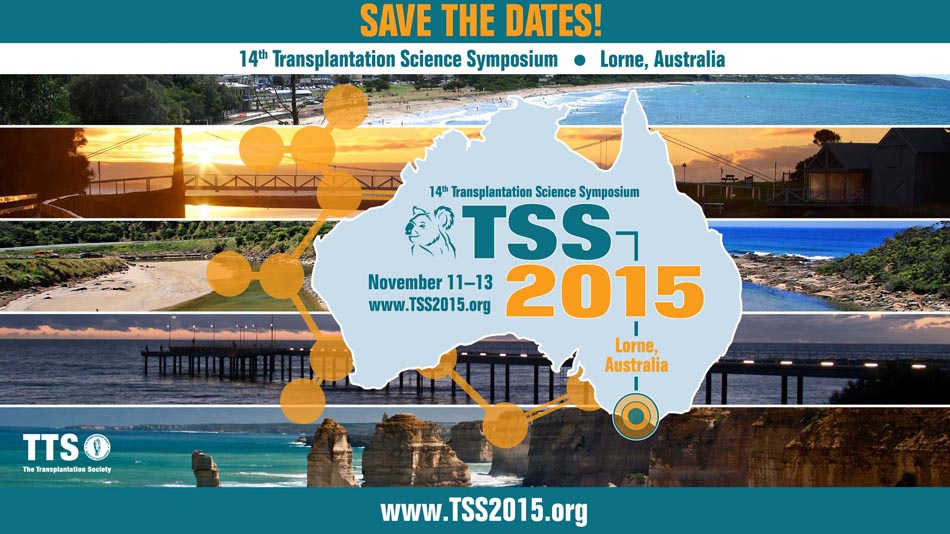

The Women in Transplantation initiative of TTS has completed a review of its activities for 2013 and is pleased to announce eleven networking events were held, with a total of more than 700 women in attendance. This year, WIT will host five networking events, some with past partners (ISHLT, MESOT and ASHI) and some with new partners (ASTS/AST and ITNS).
WIT is also excited to announce that a WIT Sunrise Symposium will take place during WTC, scheduled for Thursday, July 31 at 7:00 am. The symposium will cover a variety of topics including: “Women as Caregivers, Transplant Patients and Living Donors, and Women as Scientists in the Field of Transplantation”. More information about both events can be found on the WIT website at www.tts-wit.org.
The Steering Committee of WIT has also spent the early part of 2014 focused on improvements to its mentorship program, including significant changes to the web interface and application process. In 2014, WIT will increase the number of mentors available, as well as offer a broader range of mentors from each geographic and specialty area. Information about the changes to the program will be emailed to all WIT members in the coming months. If you have not signed up for mentorship or to become a mentor, we encourage you to do so on our website or by visiting the TTS booth at WTC or ITNS this year.
Thank you to all our members, mentors, mentees and event participants for making 2013 a great success and for your continued support in 2014.
2014 NETWORKING EVENTS
April 11
34th International Society for Heart & Lung Transplantation Meeting
San Diego, CA, USA
July 29
World Transplant Congress
San Francisco, CA, USA
September 10–13
14th Congress of the Middle East Society for Organ Transplantation
Istanbul, Turkey
September 27
23rd Annual International Transplant Nurses Society Symposium
Houston, TX, USA
October 20–24
40th Annual American Society for Histocompatibility & Immunogenetics Meeting
Denver, CO, USA
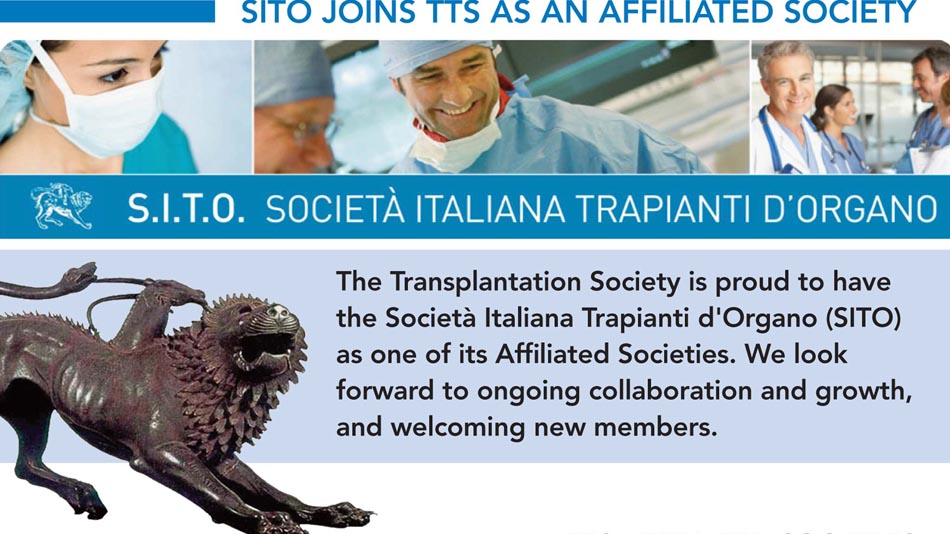
TTS AFFILIATED SOCIETIES
- Asociacion Guatemalteca de Nefrologia
- Associacao Brasileira de Transplante de Orgaos (ABTO)
- Asociacion Colombiana de Trasplantes de Organos (ACTO)
- Austrotransplant
- Belgian Transplantation Society (BTS)
- British Transplantation Society (BTS)
- Canadian Society of Transplantation / Société canadienne de transplantation (CST)
- Deutschen Transplantationsgesellschaft
- The International Nurses Transplant Society (ITNS)
- Nederlandse Transplantatie Stichting (NTV)
- Regional Health Development Center (RHDC) Croatia on Organ Donation and Transplant Medicine
- Sociedad Argentina de Trasplantes (SAT)
- Sociedad Chilena de Trasplante
- Sociedad Espanola de Trasplante (SET)
- Società Italiana Trapianti d’Organo (SITO)
- Societat Catalana de Trasplantament (SCT)
- Southern African Transplantation Society (SATS)
- The Japan Society for Transplantation (JST)
- The Korean Society for Transplantation
- The Swedish Transplantation Society
- Swisstransplant Society (STS)
- Thai Transplantation Society
- Transplant Society of Pakistan
- Transplantation Society of Australia and New Zealand (TSANZ)
- Turkish Transplantation Centers Coordination Association (TTCCA)
- Urologic Society for Transplantation and Renal Surgery (USTRS)
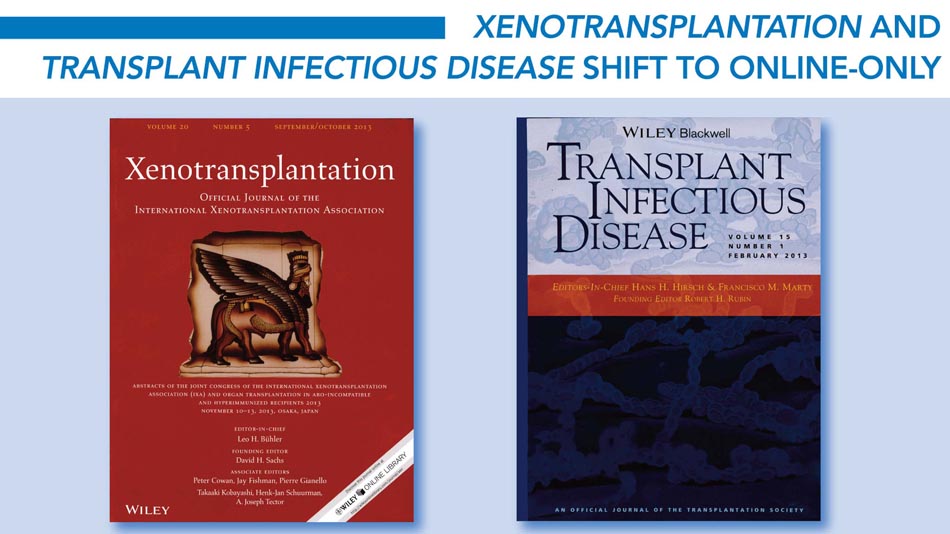
The Xenotransplantation and Transplant Infectious Disease journals have eliminated their print subscriptions and migrated to an online-only publication in early 2014. This decision was made by Wiley and based on usage and readership. Increasingly, scientific journals have been shifting to digital platforms with readers wanting to access articles anytime and anywhere on their smartphones and devices. The migration to an online-only publication allows members to access content in a variety of environments, platforms and brands. Members of TTS and its Sections can continue to subscribe to Xenotransplantation and Transplant Infectious Disease through their TTS membership accounts. Information on how to access articles will be sent out by Wiley once your order is processed, while TID and IXA members can read the journal through the respective links on the TID and IXA websites.

The Cell Transplant Society is pleased to report the Council and Committees of the Society have been hard at work on a number of new initiatives. The Council has been identifying and drafting long-term goals that will continue to maintain CTS as a leader in cellular transplantation, while adapting to trends and new directions in cellular research. The Council recognizes the strength and contributions of young investigators in the field and is working with the Membership Committee to recruit and engage more young scientists to participate in activities of the Society, including greater participation in the program development of future meetings. Additionally, the Council aims to broaden the reach of the Society and is exploring opportunities to partner with other societies focused on stem cells, regenerative cells and cell biology to co-host the 2017 CTS Congress.
The Web and Social Media Committee launched a Facebook page for the CTS in February and is collaborating with the Membership Committee to post information for members and the public that will foster conversation about cellular transplantation. The Committee will also launch a LinkedIn page for members to connect and share information in the next few months. The Membership Committee is reviewing the current membership benefits of joining the Society and evaluating what can be offered to members in non-Congress years.
Finally, planning is now well under way for our 2015 meeting with IPITA and IXA and we look forward to sharing more information about the scientific and social program in the coming months! Visit www.melbourne2015.org for all the latest news.

The IHCTAS Council has been very active discussing our Society’s purpose and activities, and the benefits available to members. The IHCTAS has been encouraging members to join IHCTAS and TTS, to demonstrate to colleagues and patients that composite tissue allotransplantation or vascularized composite allotransplantation is an important field of transplantation. This concentrated effort has resulted in new members joining the Society and the inclusion of VCA and CTA topics in the Scientific Program of the 2014 World Transplant Congress.
One of the principal goals of the Society is to promote information exchange and collaboration among the teams involved in CTA and VCA, or for those who would like to start a program. For this reason, the IHCTAS has made the latest update of the International Registry on Hand and Composite Tissue Transplantation available to members in good standing of the Society. In the coming months, additional presentations and information will be added to the Society’s website to enable members to study, comment and collaborate on new developments in the field.
The IHCTAS recently hosted the 1st Chauvet Workshop, in Paris, France on March 21 and 22; psychiatrists, psychologists and members of the teams involved in hand allotransplantation gathered to create common protocols for evaluation, follow-up and supportive treatment of upper extremity transplanted patients.
Finally, the IHCTAS is pleased to announce the 12th Meeting of the IHCTAS will take place in Philadelphia, Pennsylvania, USA. Stay tuned to www.ihctas.org for the dates and more information.

INTERNATIONAL PANCREAS & ISLET TRANSPLANT ASSOCIATION UPDATE
IPITA has a number of new initiatives focused on increasing and broadening the impact of the Association on the practice of pancreas and islet transplantation and providing greater value to its membership. At an IPITA strategic planning session held during the Monterey Congress, the Council reaffirmed important goals for the Association: 1) Increasing the utilization of pancreas and islet transplantation across the world through education of and collaboration with diabetes care teams, our administrators, payers, regulatory agencies, and organizations that coordinate donor pancreas allocation; 2) Promoting clinical research including randomized clinical trials; and 3) Promoting basic and translational research. To address these goals, the IPITA Council established six taskforces: Advocacy, Research, Finance/Sponsorship, Education, Outreach and Communication and Membership.
Highlights of a few upcoming events, recent developments and ongoing new initiatives:
- IPITA and TTS will co-sponsor a Key Opinion Leader Meeting in Oxford in May 2014 to chart the path forward in critical research issues in beta cell replacement. Experts from around the world, the NIH, and other foundations will gather and discuss the current state-of-science in many areas of research such as islet isolation, encapsulation, xenotransplantation, and stem cell-derived beta cells. A summary report of this conference will be drafted and distributed to the membership.
- A major objective of advocacy efforts will be to engage endocrinologists in the continued development, evaluation, and increased utilization of pancreas and islet transplantation.
- The Association anticipates an important role for the newly formed Senior Advisory Committee to assist IPITA in recording the Association’s history, securing additional sponsorship, and serving in an advisory role to Council.
- The Education taskforce will be active in the intermeeting years in forming a Young Investigators Committee to support and connect future leaders, and in establishing a new award to advance the careers of scientists and physicians in developing economies.
- Look for some changes and new additions to the IPITA website, www.ipita.org, in the coming months.
- IPITA recently established a membership category for Allied Health Professionals. If you are a nurse, transplant coordinator, pharmacist, technician, or social worker involved in pancreas or islet transplantation, consider becoming a member and playing an active role in IPITA. Sessions devoted to topics of interest to allied health professionals were debuted at the Monterey Congress. In an effort to encourage membership from continents such as Asia and South America where many investigators work on pancreas and islet transplantation, IPITA will establish geographical links through which we wish to engage and support our colleagues.
Many exciting new projects and initiatives are underway through which IPITA expects to provide a wide variety of tangible benefits to our membership as we continue to actively advocate for pancreas and islet transplantation. As we move forward with these activities to strengthen our Association, we invite you to share your feedback, comments, and suggestions (sections@tts.org).

2013 has been a successful year for the ISODP. The Australian DonateLife Network and The Transplantation Society of Australia and New Zealand hosted the 2013 Congress in Sydney and, with more than 560 participants, 233 abstracts and 30 participating countries from around the world attending, it was a resounding success. As a result, this collaboration enabled numerous experts in organ donation and transplantation to give high-caliber presentations, to exchange new ideas and to stimulate lively discussions. On behalf of all the 2011–2013 Councilors, we would like to express our sincere thanks to Jeremy Chapman, Congress Chair; Jonathan Gillis, Program Chair, and their dedicated team for an exciting and well-organized congress and their very gracious hospitality. Also to Yael Cass the Chief Executive Officer from the Organ Tissue Authority team for their leadership, participation and inspiration as they shared with the world the terrific development and evolution of the authority in such a short time. TTS and ISODP members may download the recordings by visiting www.isodp.org.
As of November 2013, the ISODP welcomed its new President and Council. Kimberly Young from Canada is the President for the 2013–2015 term, followed by Marti Manyalich from Spain in 2015. New council members Helen Opdam, Haibo Wang, Louis Beaulieu, and Martin Alejandro Torres received a warm welcome; their enthusiasm and input are of utmost importance to further develop organ donation and procurement worldwide. The Councilors at the Sydney Congress revitalized the strategic plan - an important advancement in 2014 is a monthly webinar a series featuring speakers from around the world. This is an ideal opportunity for doctors, coordinators and allied health professionals working in the field, to improve their knowledge and to take part in discussions without the expense of travelling.
The ISODP can provide knowledge necessary to further improve organ donation in your region. While in the past we have had success with the scholarship program, the ISODP Council, in conjunction with TTS President, Francis Delmonico, is developing the program to locally assist interested countries in learning how to address specific hurdles in their country.

Our Association is pleased to announce the new President of IXA as, Takaaki Kobayashi (Nagoya, Japan), following the outstanding leadership of Bernhard Hering (current president of the IPITA). The Council has also welcomed Michael Breimer (Sweden), Shuji Miyagawa (Japan), David Sachs (USA), and Eckhard Wolf (Germany) as new Councilors. The complete Council composition can be found on the IXA website at www.tts.org/ixa.
Sadly, Dr. Carl-Gustav Groth, who played a major role in the founding of the International Xenotransplantation Association and served as its first President in 1997, recently passed away. Dr. Groth had a special involvement in xenotransplantation throughout his career, being the first to initiate a clinical trial with pig islets in the 1990’s and also the past Editor-in-Chief of the journal Xenotransplantation. The Carl-Gustav Groth Xeno-Prize, a joint initiative of IXA and Wiley, the publisher of Xenotransplantation, is awarded to the author of the best publication in the journal each year. The winner of the 2013 Xeno-Prize is currently being selected and will be announced shortly.
A Vanguard committee, chaired by Christopher Burlak (recipient of the 2012 Xeno-Prize), has been created under the initiative of our past president, Bernhard Hering, in order to provide a forum for young scientists to interact with leaders and increase the awareness of research trends and techniques in the field of xenotransplantation. Following the successful 2013 IXA Congress, held jointly with the iABO and Hyper Immune Symposium in Osaka, planning for the 2015 joint IPITA-IXA-CTS Congress is underway. It will be held in Melbourne, Australia from November 15–19, 2015 (for more information, please visit: www.melbourne2015.org).

The ITA is pleased to announce ongoing progress and activity in our Association. Since the last newsletter, the Council has held conference calls in November, January and March; our four committees – Scientific, Education and Regulation, Membership and Allied Health – have been formed with Chairs and members appointed. The ITA has sent an announcement to its membership asking for members interested in participating in these committees, and so far the response has been excellent. All the committees have had at least one organizational call, and have set forth missions and goals to be accomplished within the next year. Information about these committees, their activities and members can be found on the ITA website, www.tts.org/ita, under the “About ITA” tab.
The XIV International Small Bowel Transplant Symposium (ISBTS) planning is well underway. The Symposium will take place at the Catholic University of Argentina in Buenos Aires..The date for the Symposium was changed due to conflicts with other meetings; the new date is June 10–13, 2015. The Scientific Planning Committee is in the process of being finalized and work on the program will begin shortly. You can stay up-to-date by logging onto XIV ISBTS website at, www.isbts2015.org.
The Council is also pleased to announce the following bidding cities for the XV ISBTS, which will take place in 2017: Cleveland, OH, USA; Durham, NC, USA; and New York, NY, USA. This spring, the Council will take part in presentations from each and make a final decision on the host city during our Council meeting in July 2014.
The first ITA Newsletter is underway at last and we expect to have a finalized version out to our membership and posted on our website by May 2014.
Lastly, the 2014 World Transplant Congress (WTC) in San Francisco, CA, USA is rapidly approaching. We look forward to networking with all of our fellow ITA members during the meeting. The ITA Council is always looking for feedback from its members about our ongoing activities; if you have any recommendations or suggestions please email sections@tts.org and someone from the Council will be in touch.

The new Council of Transplant Infectious Disease is working hard to continue to develop the Society as a vibrant, innovative and interactive group and to increase our presence in previously neglected areas such as Asia and South America. To this end, there have been two important recent developments:
- Councillor Clarisse Machado has arranged an outstanding meeting in October 2014, the São Paulo School of Advanced Science on Transplant Infectious Diseases (SPSAS- TID); which will provide funding for 100 fellows, nurses and pharmacists that are closely involved in transplantation to attend.
- The first-ever opportunity to involve clinicians in Asia will be the inclusion of a Transplant Infectious Diseases programme immediately prior to the Asia Pacific Society for Chemotherapy and Infectious Diseases in November 2014.
Ban Hock Tan has been at the helm of negotiations and a draft programme is now in place, with funding to be sought over the coming weeks.
The 2013 TID Conference in Vienna was an outstanding success. A total of 129 people participated in the Conference, one of our largest to date. The overall rating from the evaluation forms was 4.7/5 (extremely satisfied) and 100% of attendees said they would attend a future meeting.
In anticipation of reaching a wider infectious disease audience and increasing the number of members of TID, we have joined with the European Society for Clinical Microbiology and Infectious Diseases to hold our first ever TID meeting back-to-back with an Infectious Diseases conference rather than a transplant meeting. This will take place in Barcelona, Spain on May 9th, immediately prior to ECCMID.
The TID webinar series has continued into 2014. The first presentation was held on January 22nd, and featured Nassim Kamar discussing hepatitis E in transplantation. The other webinars that took place were ‘Polyomavirus: Interesting and Curious Infections beyond BK’ presented by Ligia Camera Pierotti on March 21, 2014; and “Rapid Diagnostic for Invasive Fungal Infections in the Solid-Organ Transplant Recipient” presented by Ban Hock Tan on April 9, 2014.
2014 promises to be an exciting year and we hope TID will continue to provide leadership for clinicians involved in transplant infectious diseases.
TTS gratefully acknowledges the Corporate Partners whose generous support makes the work of the Society possible:
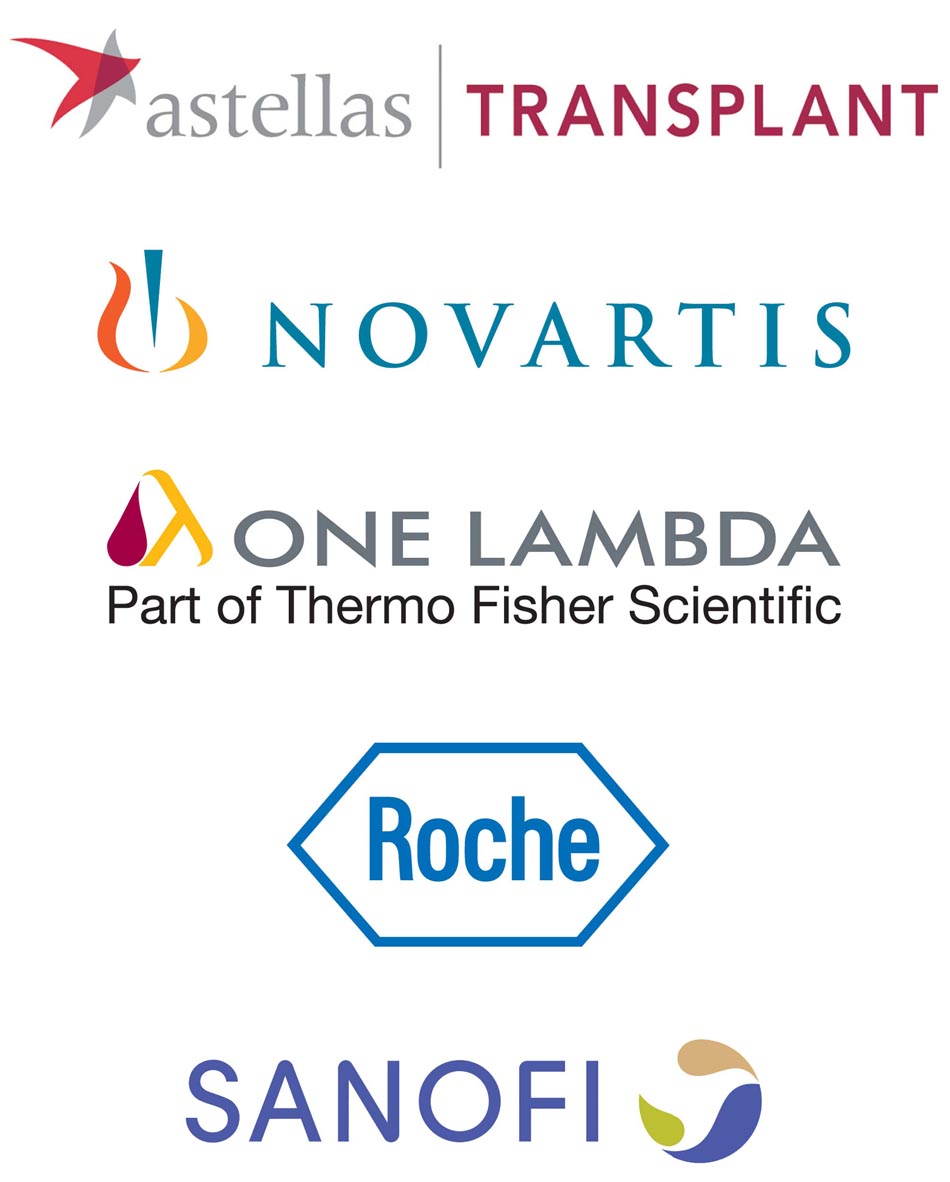
To consolidate its position as the leading global organization, the Council has representation from all six regions of the world: North America, Latin America, Europe, Middle East/Africa, Oceania, and Asia.
| PRESIDENT | Francis L. Delmonico |
| PRESIDENT-ELECT | Philip J. O’Connell |
| IMMEDIATE PAST PRESIDENT | Gerhard Opelz |
| VICE-PRESIDENT | Ron Shapiro |
| SECRETARY | Gabriel Danovitch |
| SENIOR TREASURER | Marcelo Cantarovich |
| TREASURER | John J. Fung |
| HISTORIAN | Randall E. Morris |
| INTERNATIONAL HEADQUARTERS | Jean-Pierre Mongeau (Executive Director) |
| COUNCILORS | Nancy Ascher (North America) Rudolf Garcia-Gallont (Latin America) Vivekanand Jha (Asia) Dirk R.J. Kuypers (Europe) Elmi Muller (Middle East / Africa) Philip J. O’Connell (Oceania) Maria Cristina Ribeiro de Castro (Latin America) Vasant Sumethkul (Asia) Megan Sykes (North America) Shiro Takahara (Asia) Annika Tibell (Europe) Stefan G. Tullius (North America) |
Tribune is published three times per year by The Transplantation Society (TTS).
Editor-in-Chief: |
Nancy K. Man |
Contributors: |
Medhat Askar |
International Headquarters |
The Transplantation Society |
For assistance, please contact any of our dedicated staff: |
Roman Beliaevski Roberto Colarusso Geneviève Leclerc Sondra Livingston Frank Lindo Verissimo Amanda Mayer Jean-Pierre Mongeau Alexandra Murphy Catherin Parker Eugenia Siu Kathy Tsandilas Darren Woodbury Chi Hong Yeung |
Contact
Address
The Transplantation Society
International Headquarters
740 Notre-Dame Ouest
Suite 1245
Montréal, QC, H3C 3X6
Canada
Используйте Вавада казино для игры с бонусом — активируйте промокод и начните выигрывать уже сегодня!

